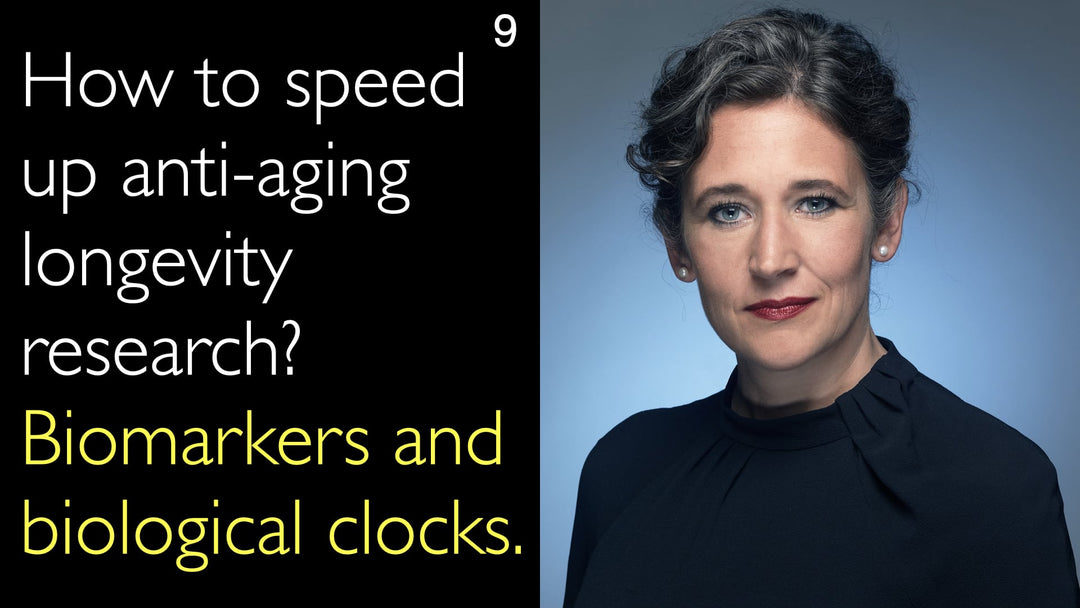מומחית מובילה בתחום ההזדקנות ואריכות חיים, ד"ר אנדראה מאייר, MD, מסבירה כיצד סמנים ביולוגיים ושעונים ביולוגיים מאיצים את המחקר נגד הזדקנות. היא דנה באתגרים של ניסויים קליניים ארוכי טווח בבני אדם. ד"ר מאייר מפרטת את השימוש בשעונים אפיגנטיים למדידת שינויים בגיל הביולוגי בתוך חודשים. היא מדגישה את הצורך בסמנים ביולוגיים מאומתים הנתמכים על ידי גופים רגולטוריים. ד"ר מאייר תומכת בשימוש בתוספים ותרופות מבוססי ראיות.
קידום מחקר האריכות ימים באמצעות סמנים ביולוגיים ושעונים ביולוגיים של גיל
קפיצה לפרק
- אתגרים במחקר האריכות ימים
- דינמיקות שוק האנטי-אייג'ינג
- סמנים ביולוגיים וגיל ביולוגי
- האצת ניסויים קליניים
- חשיבות האימות הרגולטורי
- מחקר האריכות ימים בעתיד
- תמליל מלא
אתגרים במחקר האריכות ימים
ד"ר אנדראה מאייר, MD, מדגישה את הקשיים המובנים במחקר האנטי-אייג'ינג. ניסויים באריכות ימים בבני אדם דורשים מסורתית פרקי זמן נרחבים. ד"ר אנטון טיטוב, MD, מציין את חוסר הסבלנות עם תהליכי הבדיקה התרופתיים המסורתיים. ד"ר מאייר מכירה באתגרים אלה אך מדגישה שסטנדרטים מדעיים קפדניים הם חיוניים.
דינמיקות שוק האנטי-אייג'ינג
שוק האנטי-אייג'ינג העולמי מציג הן הזדמנויות והן סיכונים. ד"ר אנדראה מאייר, MD, מסבירה שהגדרת ההזדקנות כמחלה באמצעות קודי ICD-11 יוצרת שוק פוטנציאלי עצום. זה מושך השקעות משמעותיות למחקר האריכות ימים. עם זאת, ד"ר מאייר מזהירה מתוספים לא מוכחים שעשויים לספק רק אפקט פלצבו.
היא מדגישה את החשיבות של חזרה למדע בסיסי כדי להבין מנגנונים. ד"ר אנטון טיטוב, MD, דן בריבוי החברות לאנטי-אייג'ינג שמוכרות תוספים ללא נתונים אנושיים ברורים.
סמנים ביולוגיים וגיל ביולוגי
סמנים ביולוגיים מייצגים פריצת דרך במתודולוגיית מחקר האריכות ימים. ד"ר אנדראה מאייר, MD, מדגישה במיוחד את השעונים האפיגנטיים ככלים רבי עוצמה. מדידות גיל ביולוגי אלה יכולות לזהות שינויים דרמטיים בתוך ארבעה חודשים בלבד. גישה זו עוקפת את הצורך להמתין להתפתחות מחלה על פני 10-20 שנה.
ד"ר אנדראה מאייר, MD, מסבירה כיצד סמנים ביולוגיים מספקים עדות כמותית להתערבויות בהזדקנות. הרגישות של סמנים אלה מאפשרת לחוקרים לזהות היפוך גיל ביולוגי.
האצת ניסויים קליניים
ניסויים קליניים מודרניים להתערבויות באריכות ימים יכולים כעת להניב תוצאות בתוך שנה. ד"ר אנדראה מאייר, MD, מתארת עיצובי מחקר שבהם משתתפים מקבלים התערבויות למשך 4-6 חודשים. החוקרים מודדים אז השפעות באמצעות סמנים ביולוגיים מאומתים במקום להמתין לנקודות קצה של מחלה.
ד"ר אנטון טיטוב, MD, מדגיש את החשיבות של אמון בסמנים אלה לתוצאות אמינות. ציר זמן מואץ זה הופך את מחקר האריכות ימים בבני אדם ליותר בר ביצוע ויעיל.
חשיבות האימות הרגולטורי
קבלה על ידי גופים רגולטוריים מייצגת אבן דרך קריטית עבור סמנים ביולוגיים של אריכות ימים. ד"ר אנדראה מאייר, MD, מדגישה שאישור FDA ו-EMA (סוכנות התרופות האירופית) הוא חיוני עבור התערבויות אנטי-אייג'ינג. גופים אלה חייבים לאמת סמנים ביולוגיים לפני אישור תרופות לאוכלוסייה מזדקנת.
ד"ר אנדראה מאייר, MD, מציינת שדורש השקעת מחקר משמעותית וניסויים אקראיים מבוקרים. תהליך האימות מבטיח שסמנים ביולוגיים עובדים הן בפרקטיקה קלינית והן בהגדרות מחקר.
מחקר האריכות ימים בעתיד
עתיד מחקר האנטי-אייג'ינג תלוי בפיתוח ואימות מתמשכים של סמנים ביולוגיים. ד"ר אנדראה מאייר, MD, מדגישה את הצורך בגישות מבוססות ראיות למרות לחצי השוק. היא תומכת בתרגום מהיר ממדע בסיסי לניסויים בבני humans באמצעות סמנים ביולוגיים רגישים.
ד"ר אנטון טיטוב, MD, דן בחשיבות של שמירה על קפדנות מדעית במחקר האריכות ימים. התחום ממשיך להתפתח עם סמנים ביולוגיים חדשים וטכניקות מדידה שצצות על בסיס קבוע.
תמליל מלא
ד"ר אנטון טיטוב, MD: מחקר האנטי-אייג'ינג מאיץ, למרבה המזל. ניסויי אנטי-אייג'ינג בבני humans לוקחים זמן רב; הם מאוד קשים לביצוע. אז כמה מדענים בסיסיים מכובדים נמצאים באתרי האינטרנט של חברות אנטי-אייג'ינג שמפתחות מספר תרכובות. הם לרוב מוכרים תוספים ללא נתונים אנושיים ברורים.
האם זה סימן שהמדע המודרני של אנטי-אייג'ינג מאבד סבלנות עם תהליך הבדיקה התרופתי המסורתי? יש שוק עצום שם בחוץ כי כולם מזדקנים.
ד"ר אנדראה מאייר, MD: ואם נגדיר הזדקנות כמחלה, לפי הסיווג הבינלאומי של מחלות, יש את קודי ICD-11. מצבים או חריגות הקשורים להזדקנות יכולים כבר להיות מחלה. כולם מזדקנים; אתה יכול לדמיין שהשוק מאוד גדול. זה דבר טוב, וזה דבר רע.
אני רואה שיש הרבה השקעות בתחום שלנו, וזה בהחלט דבר טוב. אבל מה שאנחנו צריכים לוודא זה שאנחנו מספקים איכות, כי אנחנו לא רוצים למכור הרבה תוספי אנטי-אייג'ינג ללא השפעות מוכחות.
אולי יש effect, אבל זה יכול להיות רק פלצבו כי אתה חושב שזה עובד. אז זה מאוד חשוב לחזור למדע בסיסי ולומר, "אוקיי, למה תוסף מסוים יעבוד בתאים, ומה המנגנונים?" אז להביא תוספים very quickly לבני humans כדי לבדוק אם יש effect חיובי.
אני מסכים איתך שלוקח זמן רב להוכיח שסוגים אלה של תוספים או תרופות עובדים. עם זאת, זה בר ביצוע. אני לא חושבת שאנחנו יכולים להשתמש בטיעון שבגלל זמן והשקעה, אנחנו לא צריכים לעשות את זה, כי אנחנו צריכים את הראיות בצורה מאוד כמותית.
אז מה שאנחנו עושים כדי להתגבר על הקושי הוא שמחקרים בבני humans לוקחים זמן רב. אנחנו חייבים לחכות until אדם develops another disease; זה can take 10, if not 20, years. אין לנו את הזמן.
אנחנו משתמשים בסמנים ביולוגיים. אז אנחנו משתמשים בסמנים ביולוגיים כמו השעון האפיגנטי כדי לקבוע את הגיל הביולוגי. וכבר הראינו שתוך ארבעה חודשים, הגיל הביולוגי יכול להשתנות dramatically.
אז while doing the experiments—לא לחכות until we've overcome the next disease—אנחנו יכולים להשתמש בסמנים ביולוגיים. אנחנו יכולים להקים ניסוי קליני where participants get drugs for four to six months, ואנחנו then measuring the effects.
So in the end, it takes a year until we would have results from these kinds of longevity trials and supplements.
ד"ר אנטון טיטוב, MD: Well, this is very important to know that there is a way to do longevity clinical trials in humans. That's clear.
As long as one can trust the markers, then that should work.
ד"ר אנדראה מאייר, MD: So this is a very important point: we need biomarkers that are sensitive to change. They can detect if somebody is younger. But regulatory agencies must also accept these biomarkers—the FDA or the EMA—because these are the institutions who will say, "Yes, you can apply this drug to aging individuals or not."
So we must validate all the biomarkers. That's a huge amount of research and investment in the longevity field. We have lots of data.
We have randomized controlled trials to see which biomarker is valid to use, not only in clinical practice but especially also as an outcome in randomized controlled trials.




